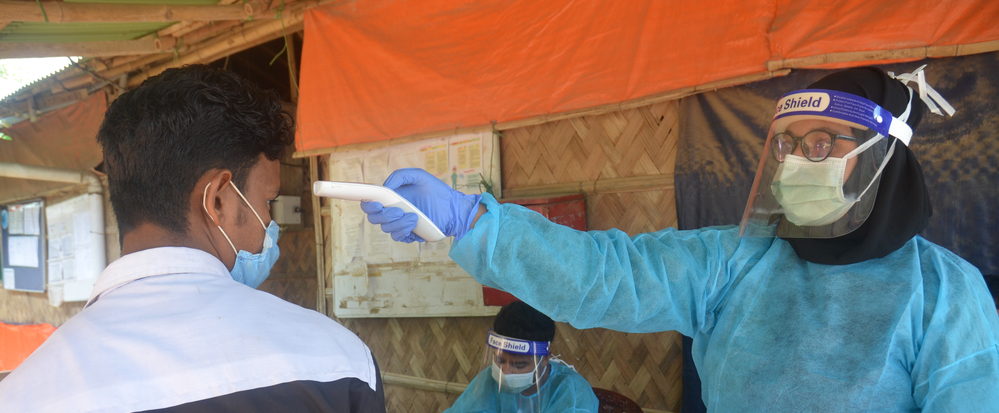MSF Project Update: COVID-19 stigma and disrupted care in Bangladesh
Across Bangladesh, the numbers of people suffering from COVID-19 has climbed persistently since March. At time of writing, there are over 149,000 cases – but as in all countries, these figures show only a tiny fraction of the story. The pandemic is having a catastrophic effect on all aspects of people’s lives; from rising unemployment to access to basic healthcare.
MSF teams are treating patients who are facing COVID-19 in Bangladesh. People are confronted with the challenges of accessing normal medical care as services reduce, while those who test positive for COVID-19 face stigma and discrimination.
Disrupted Services
Many health facilities, including those run by MSF, have had to make the distressing decision to reduce or close services due to staff shortages and lack of essential medical supplies and protective equipment. Across Cox’s Bazar District and in Dhaka, MSF has had to focus on lifesaving activities only. Many people fear going to medical facilities facility for fear of catching the virus, while lockdown measures have made travel difficult.
- In MSF’s Golymara mother and child hospital Bangladeshi mother, Noor Haba’s daughter Shahara is being treated for thalassaemia, a genetic blood disorder which causes decreased haemoglobin levels and can be fatal if not treated with regular blood transfusions. Her limbs are stick thin and her stomach is extended from a swollen spleen and malnutrition. Because of the pandemic, they’ve been waiting for a blood donor for 3 days now.
- “We’re searching everywhere,” Noor Haba says. “Normally we can easily find someone to give blood. But this time I can’t find any blood donors due to the COVID-19 situation. No one wants to come to the hospital because they feel afraid.”
- “It’s so hard,” Noor Haba says. “I have no money to go home. We have five children and I don’t know how we’ll feed them.”
- Due to COVID-19 MSF is now unable to offer planned support aimed at improving quality of life for thalassaemia patients and while also making it easier for struggling families like Noor Haba’s.
- MSF paediatrician Ferdyoli Porcel says: “For me, the most problematic thing is that people will start dying not from COVID-19, but from other diseases – normal diseases that we could treat.”
Stigma
Many people suffering from COVID-19 symptoms face the dual challenge of tackling the virus together with the social consequences of being diagnosed positive. Patients with COVID-19 have told MSF staff of families being taken to quarantine centres against their will; of being threatened with eviction from their homes; and of being subjected to aggressive and threatening language.
- Mohammad, a Rohingya father living in one of the many refugee camps in Cox’s Bazar district, was diagnosed with COVID-19 and taken to MSF’s Kutupalong field hospital, where he was isolated and received treatment.
- “People were threatening, saying they would burn our house down if my family didn’t go into quarantine,” he says. “It was so shameful for my family. They felt extremely frightened.”
- As Mohammad explains: “It is experiences like this that are discouraging people from coming to health clinics if they have COVID-19 symptoms.”
Hopes for the future
MSF continues to run reproductive health services in all its facilities in Bangladesh but the COVID-19 pandemic has affected these too.
- New mother Syeda and her newborn baby were diagnosed with COVID-19 soon after she gave birth. They are receiving treatment at MSF’s Goyalmara hospital.
- “This is my first baby,” says Syeda. “But right now I can’t think about our future at all. Once my baby is well, then I can think about it.”
- In MSF’s Jamtoli clinic , Rohingya refugee Shokutara, sits beside her newborn son, born hours earlier.
- “I am worried about COVID-19 because we know about the virus,” Shokutara says. “People tell us to maintain space, but that isn’t possible to do because we live close together. But still we try as best we can.”
- “In Myanmar we faced so many hardships and were afraid. They tortured us,” she says. “So I am happy here. I want my son and my daughter to both become educated so they can have a good future.”
